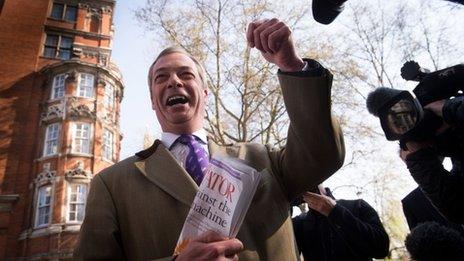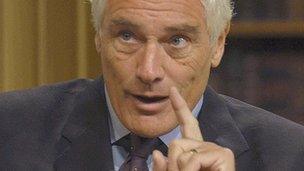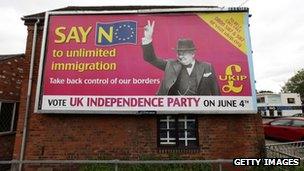How UKIP became a British political force
- Published

Winning council seats across England, challenging for victory in Westminster by-elections, overtaking the Lib Dems in the polls - how did UKIP go from the fringes to a force in British politics?
The UK Independence Party has, as its name implies, one key policy - to leave the European Union.
It is a simple, understandable message, which has led to the party gaining bigger shares of the votes in European elections.
But it is also one which means people often dismiss it as a single issue party, unlikely to become a force in Westminster politics.
It has spent considerable effort on broadening its appeal. And judging from recent opinion polls its wider policies - grammar schools, curbing immigration and opposing gay marriage - seem to have struck a chord with disenchanted voters from the "big three".
In successive Westminster by-elections - and now in local elections - it seems to have become the party of choice for the anti-government and anti-politics vote.
Defying predictions
It has proved capable of causing upsets in Tory and Lib Dem heartlands in the South of England and, as the South Shields by-election demonstrated, Labour strongholds in the North.
It has - to an extent - set out to emulate what the Lib Dems did in the 1980s and 1990s by building a network of local councillors as a springboard to success on the national stage.
It has realised the hard way that it is not enough just to pitch up at a by-election with a loud hailer and some media-friendly stunts, it requires months, even years, of groundwork in the local area.
The party's campaigning effort has become far more professional and well-funded in the past two years as a result. It is learning the highly specialised discipline, once the domain of the Lib Dems, of winning elections.
The party has yet to make a breakthrough into Westminster politics - it does not have a single MP - but it came agonisingly close in the Eastleigh by-election last month, where it came within 2,000 votes of victory.
And by establishing the beginnings of a power base in local government, something which had so far eluded it, it can concentrate on its aim of winning next year's European elections and its first representation at Westminster in the 2015 general election.
But UKIP is no overnight success or, as it can sometimes seem from the ubiquity of leader Nigel Farage on the airwaves, a one-man party.
It has had more twists and turns - and splits and schisms - in its 20 year history than a soap opera, with an equally colourful cast of characters.
Small parties have a habit of disintegrating into internal warfare or being wiped out by the vagaries of the electoral system and political fashion - British politics has seen a few come and go over the years.
UKIP has - so far - managed to keep its show on the road and defy the predictions of those who were ready to write the party off as, in the often quoted words of David Cameron, "fruitcakes and loonies".
Modest beginnings
The party was founded on 3 September 1993 at the London School of Economics by members of the Anti-Federalist League, which had been founded by Dr Alan Sked in November 1991 with the aim of running candidates opposed to the Maastricht Treaty in the 1992 general election.
UKIP's early days were overshadowed by the much higher profile and well-financed Referendum Party, led by Sir James Goldsmith, which was wound up soon after the 1997 election.

Robert Kilroy Silk: Was the public face of the party for the 2004 European elections success
The new party's initial successes were all in the proportional representation elections for the European Parliament - winning its first three seats in 1999 with 7% of the vote.
It built on that in 2004, winning 12 seats and pushing the Lib Dems into fourth place. The 2009 poll saw its total grow to 13 seats, pushing Labour into third place with 16% of the vote.
General elections, however, with their first-past-the-post voting systems, have been a very different story and the party has failed to make the breakthrough it has been hoping for.
In 2001 it saved its deposit (that is, got at least 5% of votes) in just one seat. In 2005 it saved its deposit in 38 seats but lost its deposits in 451 others - costing about £225,500. Even its then leader, former Tory MP Roger Knapman, could only poll 7% of the votes in Totnes, Devon.]
Kilroy was here
In 2010 it was led into the general election by Lord Pearson of Rannoch but again lost out, with just 3% of the vote across the UK, although there were signs of progress as it saved its deposit in 100 seats.
The party had hoped to make headlines after Nigel Farage stood down as leader so he could take on Speaker John Bercow in Buckingham at the 2010 election - he did make the headlines but it turned out they were about a plane crash that almost cost Farage his life, rather than election success.
Farage recovered from his injuries and returned to head the party later in the year, in the latest instalment of the colourful story of UKIP's leadership.
Original leader and UKIP founder Alan Sked quit before the 1999 European elections, after arguing the party should refuse seats in the "gravy train" of the Strasbourg Parliament.
Shortly after that, the national executive lost a no confidence vote and leader Michael Holmes resigned, although he remained an MEP.
Mr Knapman took over the role of leader in 2002, but in 2004, a new pretender to the crown - former Labour MP and chat show host Robert Kilroy-Silk - arrived in a flurry of publicity to shake things up once again.
Before long he was openly jockeying for the leadership and was the media face of the party for its 2004 European election success - but when Mr Knapman refused to stand aside for him, Mr Kilroy-Silk quit and formed his own short-lived rival party.
Some thought that without ex-TV host Kilroy's recognition factor the party might struggle.
Farage returns
In 2006, the lower-key Knapman retired, to be replaced by Nigel Farage, a confident media performer, who pledged to make UKIP a "truly representative party", ending its image as a single-issue pressure group.
He spearheaded its success at the 2009 European elections and raised UKIP's profile, but then surprised his own party conference in September 2009 by standing down as leader.

A UKIP billboard from the European elections in 2009
Mr Farage said he would instead run for a seat in the Commons - specifically the seat of Commons Speaker John Bercow, which, by convention, other major parties do not fight. Mr Farage said it was "very important that UKIP gets a voice in Westminster".
It did not achieve this in 2010 but the party has seen its poll ratings rise since the general election, overtaking the Lib Dems on a number of occasions, and putting in strong showings in recent by-elections.
David Cameron's historic pledge to hold and an in/out referendum on UK membership of the EU if the Conservatives won the next election was interpreted by some as an attempt to halt the rise of UKIP, which senior Tories feared could prevent them from winning an overall majority in 2015.
'Engaging geezer'
If that was Mr Cameron's plan, it does not appear to have worked.
Mr Farage criticised the decision to delay the vote by five years, he claimed the prime minister's promise showed "we have changed the political agenda in this country" calling it "our proudest achievement to date".
Asked what he would do if the British people voted to remain in the EU, Mr Farage joked that he would have to get a "proper job". But the party's success in local elections suggests it might have a future even without the European issue, as a libertarian, right wing alternative to a centrist Conservative Party.
UKIP appears to have struck a chord with many voters on the issue of immigration, campaigning against the relaxation of working restrictions on Bulgarians and Romanians due to come into force in January.
It has rejected claims by cabinet minister Ken Clarke and others that it is simply "against" foreigners, arguing that it is in favour of a sensible "managed" migration policy, something Mr Farage argues is not possible while Britain remains in the EU.
UKIP took a calculated decision to ramp up its efforts in this year's local elections, an arena in which it has previously struggled to make an impression.
Rapidly increasing its number of candidates to more than 1,700 - three times the number that stood in the same contest in 2009 - did not come without problems.
Farage admitted the party had not had time to properly vet all of its new recruits and he was forced to suspend a handful of them following newspaper reports of alleged racist comments.
It has been a key part of his strategy to distance the party from the far right - its constitution bans former BNP members from joining.
But the gamble appears to have paid-off with gains being made across the Conservative-dominated councils up for election.
Mr Farage's maverick style - his fondness for a pint of beer, disarming frankness and ability to laugh at himself - has given him a similar kind of appeal to voters as Boris Johnson, who has described the UKIP man as "a rather engaging geezer".
He claims to have no ambition for high office - and with the party still lacking representation at Westminster that is not going to happen soon - but it has, against all the odds, established itself as a genuine force.
The question now, for Farage's nervous rivals in the big three parties, is what next?